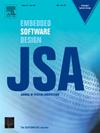VFBoost-MO:多类问题的可缩放垂直联合梯度提升决策树
IF 4.1
2区 计算机科学
Q1 COMPUTER SCIENCE, HARDWARE & ARCHITECTURE
引用次数: 0
摘要
垂直联邦学习作为保护数据隐私的一项关键技术,近年来在学术界和工业界都得到了迅速发展。值得注意的是,secureboost和secureboost+都是使用梯度增强树的加性集成模型,已经在许多应用中得到了广泛的应用。本文提出了一种基于梯度增强决策树(gbdt)的垂直联邦学习(VFL)框架。现有的VFL方法主要局限于二元分类,而多类方法的计算和通信复杂度较高。VFBoost-MO通过引入类对选择算法来解决这些挑战,该算法每次迭代构建单个向量树,显著降低了复杂性。此外,该框架采用本地差分隐私(LDP)来保护数据隐私,而不依赖于计算上昂贵的加密技术。我们对8个公共数据集进行了理论分析和实验评估,证明VFBoost-MO在训练速度和收敛率提高2-3倍的同时,实现了与最先进方法相当的精度。本文章由计算机程序翻译,如有差异,请以英文原文为准。
VFBoost-MO: Scable vertical federated gradient boosting decision tree for multi-class problem
As a key technology to protect data privacy, vertical federated learning has recently been developed fast in both academia and industry. Notable works such as secureboost and secureboost+, which are all additive ensemble models that use a gradient boosting tree have been widely used in many applications. This paper proposes VFBoost-MO, a novel vertical federated learning (VFL) framework for multi-class classification using gradient boosting decision trees (GBDTs). Existing VFL methods for GBDTs are primarily limited to binary classification, while multi-class methods suffer from high computational and communication complexity. VFBoost-MO addresses these challenges by introducing a class-pair selection algorithm that constructs a single vector tree per iteration, significantly reducing complexity. Additionally, the framework employs local differential privacy (LDP) to protect data privacy without relying on computationally expensive encryption techniques. We present a theoretical analysis and experimental evaluation on eight public datasets demonstrating that VFBoost-MO achieves comparable accuracy to state-of-the-art methods while offering 2-3x performance improvement in training speed and convergence rate.
求助全文
通过发布文献求助,成功后即可免费获取论文全文。
去求助
来源期刊

Journal of Systems Architecture
工程技术-计算机:硬件
CiteScore
8.70
自引率
15.60%
发文量
226
审稿时长
46 days
期刊介绍:
The Journal of Systems Architecture: Embedded Software Design (JSA) is a journal covering all design and architectural aspects related to embedded systems and software. It ranges from the microarchitecture level via the system software level up to the application-specific architecture level. Aspects such as real-time systems, operating systems, FPGA programming, programming languages, communications (limited to analysis and the software stack), mobile systems, parallel and distributed architectures as well as additional subjects in the computer and system architecture area will fall within the scope of this journal. Technology will not be a main focus, but its use and relevance to particular designs will be. Case studies are welcome but must contribute more than just a design for a particular piece of software.
Design automation of such systems including methodologies, techniques and tools for their design as well as novel designs of software components fall within the scope of this journal. Novel applications that use embedded systems are also central in this journal. While hardware is not a part of this journal hardware/software co-design methods that consider interplay between software and hardware components with and emphasis on software are also relevant here.
 求助内容:
求助内容: 应助结果提醒方式:
应助结果提醒方式:


